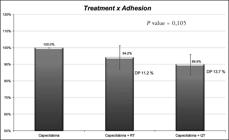Context
Capecitabine, an oral drug, is as effective as traditional chemotherapy drugs.
Objectives
To investigate the adhesion to treatment with oral capecitabine in breast and colorectal cancer, and to determine any correlation with changes in patient’s quality of life.
Methods
Patients with colorectal cancer or breast cancer using capecitabine were included. The patients were asked to bring any medication left at the time of scheduled visits. The QLQ-C30 questionnaire was applied at the first visit and 8-12 weeks after treatment.
Results
Thirty patients were evaluated. Adherence was 88.3% for metastatic colon cancer, 90.4% for non-metastatic colon cancer, 94.3% for rectal cancer and 96.2% for metastatic breast cancer. No strong correlation between adherence and European Organisation for Research and Treatment of Cancer QLQ-C30 functional or symptom scale rates had been found. There was no statistically significant correlation between compliance and the functional and symptom scales of the questionnaire before and after chemotherapy, with the exception of dyspnea.
Conclusions
Although no absolute adherence to oral capecitabine treatment had been observed, the level of adherence was good. Health professionals therefore need a greater focus in the monitoring the involvement of patients with oral treatment regimens. Patients with lesser degrees of dyspnea had greater compliance.
Colorectal neoplasms, therapy; Breast neoplasms, therapy; Medication adherence; Questionnaires

 Thumbnail
Thumbnail
 Thumbnail
Thumbnail

